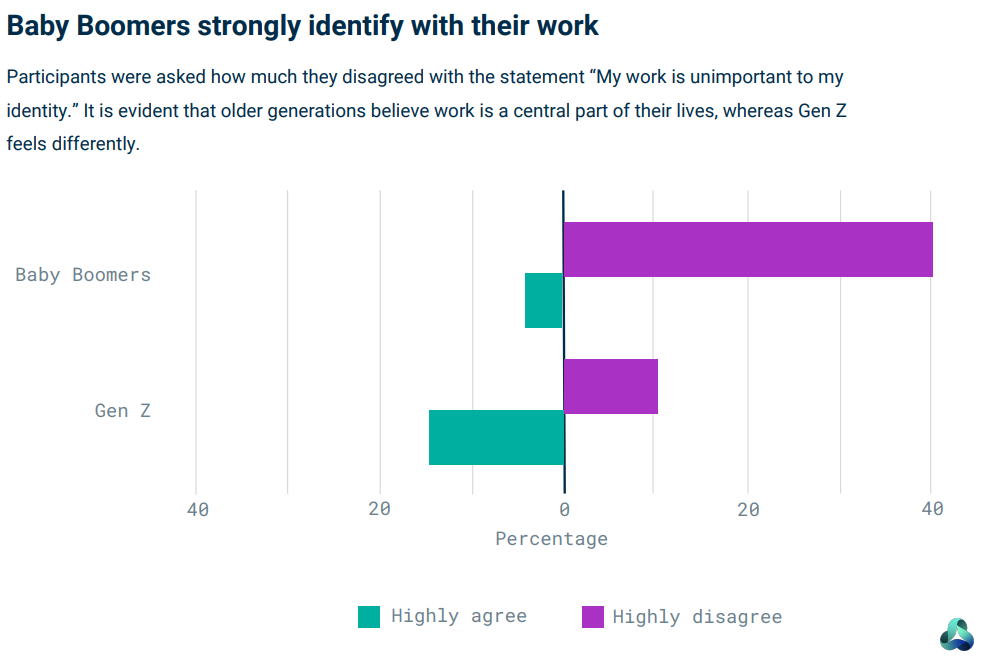Gen Z workers are significantly unhappier and less satisfied with their jobs than their older colleagues according to a new study.
The study titled ‘Happiness at Work in 2023,’ was conducted by Cangrade, a talent management firm. The firm’s research scientist Katherine Chia, asked 608 people how happy they were at work in general, and how would they rate their current workplace experiences and employer attitudes.
The results were broken down across four generations: baby boomers (born 1955-1964), Gen X (born 1965-1980), millennials (born 1981-1996) and Gen Z (born 1997-2012).
When it came to workplace satisfaction, Gen X and millennials scored highest, with 76 per cent reportedly happy at work and only 13 per cent unhappy. This stands in stark contrast with Gen Z, of whom only 59 per cent of respondents said there were happy with work, and more than a quarter (26 per cent) indicating that they were unhappy.
According to the research, there could be a number of factors why Gen Z workers were not as happy as their older colleagues. One of them being that they are just starting out their careers, and therefore they occupy generally low-paying entry-level jobs.
However, the study also made reference to another report which indicated that Gen Z may simply be less happy in general, due to relatively poor mental well-being, outsized impact of the rising cost of living and fallout from the COVID-19 pandemic which disrupted their academic journey.
So, what makes each generation happy?
Baby boomers value having their voices heard at their workplace far more than any other generations. They also placed a high value on job security.
With these two values combined, they are known to develop a sense of organisational loyalty, leading them to stay with the same company far longer than other generations would.
Meanwhile, Gen X workers highly value the ability to ‘forge their own paths,’ and work autonomously. They’re happy to self-supervise and value self-direction in the workplace.
Millennials on the other hand, seek out opportunities which allow them to ‘give back’ or have a higher purpose. One of the most crucial factors was found to be pride in the work they do.
They were also found to value more ‘fun workplace environments’ and espoused the concept of ‘work to live, not live to work.’
This leads to millennials being more likely to leave their jobs compared to previous generations. Gen Z however, takes this to the next level.
If they are unhappy with their workplace, they rarely hesitate to quit. Gen Z values a workplace which offers a work-life balance and nurtures their talents.
When comparing the oldest and youngest generation in the workplace, a stark difference is found in the degree to which they identify with their work.
When baby boomer and Gen Z respondents were asked how much they disagreed with the statement, ‘my work is unimportant to my identity,’ 40 per cent of baby boomers disagreed, while only around 10 per cent of Gen Z workers disagreed.

This creates challenges for present-day employers who might be scratching their heads as to how to attract and retain the new generation of workers. What is certainly clear is that Gen Z exceedingly prioritises learning and professional development opportunities in their jobs.
Not only do they expect development opportunities when beginning new roles, but they also expect continual learning in their careers.
Two years since its birth, Moneybase features on Microsoft’s Customer Stories
Moneybase has now just been featured on Microsoft’s latest Customer Stories
Finance Minister confirms continuity of food and energy subsidies
Spending on food and energy subsidies as a percentage of the GDP will be at 0.7% in 2025
MHRA congratulates Glenn Micallef on EU role, highlights positive impact on Malta’s tourism and cultural sectors
The lobby group emphasised that Malta’s cultural assets and sports scene are key factors in attracting visitors and fostering economic ...






